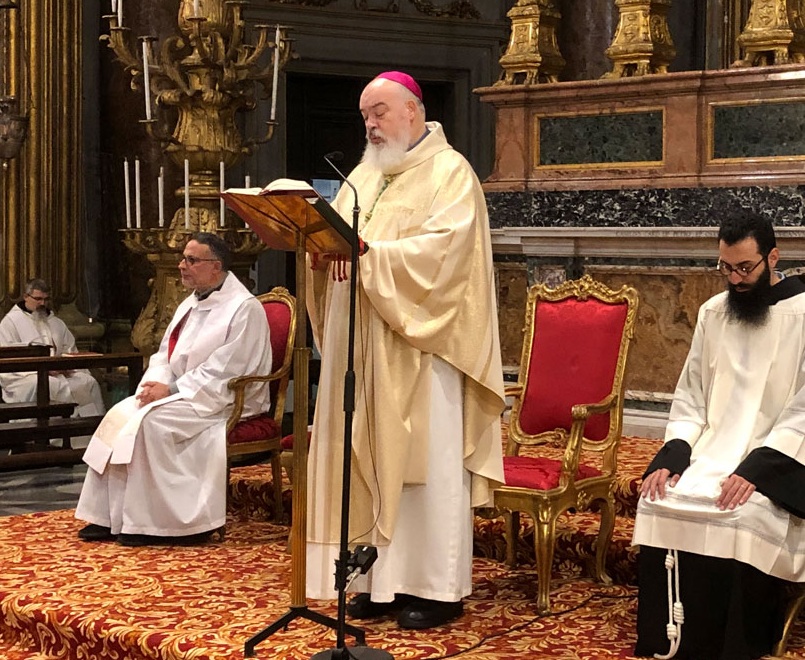Cardinal of Tehran: “worst fears” with escalation, no peace “without justice”
Cardinal Dominique Mathieu shares a second entry of his “war diary” with AsiaNews. Over the weekend, the United States bombed three nuclear sites. The succession of attacks and counterattacks “raises fears of the worst, leading us to believe that there are no longer any limits, that anything is possible and justifiable”. “Exposing the Eucharistic body of Jesus under the din of gunfire restores silence in the mind and shows that, even if the sea is rough, he is on board and calms the storm”.
Tehran (AsiaNews) - ‘Before dawn, we were awakened by the deafening noise of fighter jets and drones dropping their bombs,’ but with time ‘we get used to going back to sleep, without really being able to rest.’ This is what Cardinal Dominique Joseph Mathieu, Archbishop of Tehran-Ispahan of the Latins, writes in his second reflection sent to AsiaNews, in which he recounts the war launched by Israel against Iran and which, last night, saw the direct intervention of the United States.
‘The first thing we do after getting up,’ the cardinal continues, ‘is to go up to the roof terrace to look for smoke signals indicating the places being bombed. The other ritual is to unlock the front door and take a look at the street, which is empty of cars and people.’ Daily life has been turned upside down, as has the usual rhythm of the days, which are now characterised, Cardinal Mathieu continues, by ‘long silences, in which the slightest noise arouses fear of a new attack.’ The “surreal” escalation of ‘attacks and counterattacks’ makes one ‘fear the worst’ and that everything is ‘justifiable, such as “achieving peace through war.”’
Below are Cardinal Mathieu's reflections sent to AsiaNews:
On the eleventh day of the war:
Before dawn, we were awakened by the deafening noise of fighter jets and drones dropping their bombs, and by the stunning bursts of air defence engaging in interception. We get used to going back to sleep, without really being able to rest.
The first thing we do after getting up is to go up to the roof terrace to scan the smoke fires, which indicate the places being bombed. The other ritual is to unlock the front door and take a look at the street, empty of cars and people from one end to the other, except for an emaciated cat in search of tenderness and a bite to eat.
Most shops are closed, except for a few grocery stores and bakeries where supplies are available at prices that rise daily.
The days are no longer marked as they once were. Long silences, in which the slightest noise arouses fear of a new attack, make people wonder whether or not to do anything.
People are worried, like the disciples in the boat with Jesus asleep, struggling in the storm against the water that threatens to sink them. We wonder why Jesus seems absent, especially now that the elements are raging. And in the end, we end up shaking him to wake him up, to make him do something. In the boat, which is the Church, he reminds us that he is present. Exposing his Eucharistic body under the din of gunfire restores silence in the mind and shows that, even if the sea is rough, he is on board and calms the storm.
The Lord is the only stable connection, which must be nourished with prayer, so as not to succumb to the seductions of evil, which floods the line with fears and worries and causes us to sink. Did not the disciples say, “Master, do you not care that we are perishing?” (Mark 4:38).
The surreal escalation of attacks and counterattacks, aided by allies on one side and accomplices on the other, on extremely sensitive sites, makes us fear the worst, leading us to believe that there are no longer any limits, that anything is possible and justifiable, such as “achieving peace through war”. Peace, however, does not mean silencing people out of fear. Peace is achieved through the peaceful resolution of conflicts, working for justice, reconciliation and human dignity.
‘Blessed are the peacemakers, for they will be called children of God’ - Matthew 5:9. Peace is a fruit of love and mercy. To resolve conflicts and promote peace, we must follow the path of non-violence and dialogue. Do we have faith in Jesus, who rebukes the wind and the waves, which are calmed, restoring calm? - Luke 8:22-25. For this reason, Pope Leo XIV invokes peace - calm and order - asking: ‘May diplomacy silence the weapons!’
* Archbishop of Tehran-Ispahan of the Latins







.png)










